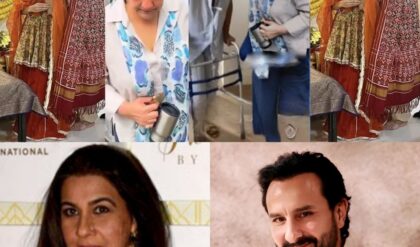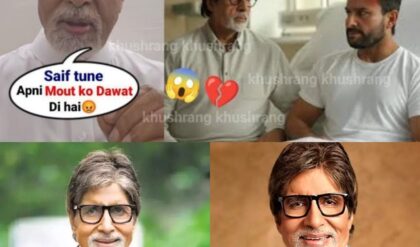In recent news, Bollywood actor Saif Ali Khan found himself at the center of an alarming incident when his residence was targeted by an attacker. The motivations behind this shocking event have left many in disbelief, especially considering Khan’s prominent status in the film industry and his connections to various high-profile personalities. As details of the attack emerged, a complex web of personal grievances, public interest, and the often tumultuous world of celebrity culture came to light.
Saif Ali Khan is not only a celebrated actor but also a member of the illustrious Pataudi family, which has long been a significant part of India’s cultural and social landscape. His lineage includes former royalty, and his marriage to actress Kareena Kapoor Khan further amplifies his visibility in the public eye. Given his stature, it is not surprising that he has attracted both admiration and envy. This duality often makes celebrities vulnerable to threats, and this incident serves as a stark reminder of the darker sides of fame.
Investigators revealed that the attacker had a personal motive rooted in a long-standing grievance against the actor. It was reported that the individual had previously worked in a capacity related to the film industry but felt wronged by the way their career had unfolded. This sense of betrayal and frustration had apparently festered over the years, culminating in the drastic decision to target Khan’s home. Such motivations highlight how personal grievances can escalate into violent actions, particularly when intertwined with the high stakes and emotional rollercoaster of the entertainment industry.
The incident raised concerns about the safety and security of celebrities in India, a country where the film industry holds immense cultural significance. The media plays a crucial role in shaping the public perception of celebrities, often blurring the lines between admiration and obsession. In Khan’s case, the relentless scrutiny and public interest in his life may have contributed to a heightened state of vulnerability. The pressures of fame often lead to a loss of privacy, leaving celebrities exposed to the whims of individuals who may feel entitled to invade their personal spaces.
Moreover, the attack on Khan’s residence underscores a broader issue within society regarding the treatment of public figures. While celebrities often enjoy a lavish lifestyle, they also face unique challenges, including harassment and threats from individuals who may feel wronged or overlooked. This incident serves as a critical reminder of the need for greater awareness and understanding of the psychological impact that fame can have on individuals. It also calls for more robust security measures to protect public figures from potential threats.
In the aftermath of the attack, Saif Ali Khan and his family expressed their relief that no one was harmed during the incident. However, the emotional toll of such an event cannot be underestimated. The psychological impact of being targeted in such a manner can lead to anxiety, fear, and a sense of vulnerability that lingers long after the physical threat has been neutralized. High-profile individuals often find themselves grappling with the duality of their existence: the public persona that they present to the world and the private individual who seeks safety and normalcy.
The incident also sparked a conversation about the responsibilities of the media in reporting on celebrities. Sensationalized coverage often fuels the obsession surrounding public figures, potentially inciting unstable individuals to act out. The line between journalistic inquiry and invasion of privacy is thin, and the media must tread carefully to avoid exacerbating the vulnerabilities of those in the public eye. Responsible reporting can play a role in mitigating the risks faced by celebrities, emphasizing the need for a cultural shift in how we engage with and consume celebrity news.
Furthermore, this incident highlights the importance of mental health support for those in the entertainment industry. The pressures of fame, coupled with personal grievances, can lead to a toxic environment where individuals feel isolated and unsupported. It is crucial for the industry to prioritize mental health resources for its members, ensuring that they have access to the help they need to cope with the unique challenges they face. By fostering a culture of openness and support, the industry can help mitigate the risks associated with fame and reduce the likelihood of similar incidents in the future.
While the motivations behind the attack remain complex, it is evident that the incident has broader implications for society as a whole. It sheds light on the vulnerabilities of individuals in the public eye and raises essential questions about the nature of fame, obsession, and the psychological toll of living under constant scrutiny. As discussions continue, it is crucial to approach the topic with empathy and understanding, recognizing that behind the glitz and glamour of celebrity culture lies a human experience filled with challenges and struggles.
As the investigation unfolds, it remains to be seen how the industry will respond to this incident. There may be calls for increased security measures for public figures, as well as a push for more comprehensive mental health support within the entertainment sector. Ultimately, this incident serves as a wake-up call for society to reflect on its relationship with celebrity culture and to consider the implications of idolizing public figures to the point of obsession.
In conclusion, the attack on Saif Ali Khan’s residence is a stark reminder of the complexities surrounding fame and the vulnerabilities that come with it. The motivations behind the attack reveal a troubling intersection of personal grievances and the pressures of the entertainment industry. As we grapple with the implications of this incident, it is essential to foster a culture of understanding and support for those in the public eye, ensuring that they can navigate their lives with the security and peace of mind they deserve. By doing so, we can help create a safer and more compassionate environment for all individuals, regardless of their status or profession.





